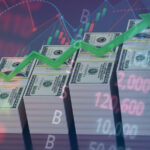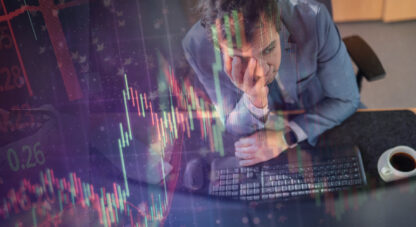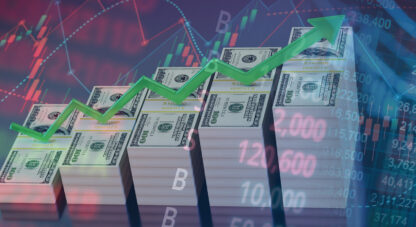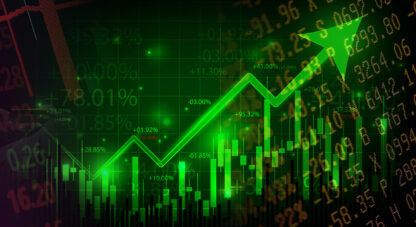Deutsche Bank (DB) dropped 13% this week to a 15-month low. DB is now down 28% y-t-d. European banks (STOXX) sank 5.0% this week. Hong Kong (Hang Seng) Financials were down 4.9%. Japan’s TOPIX Bank index fell 3.3%. In the U.S., banks (BKX) were slammed 8.0%, the “worst loss in two years.” The Broker/Dealers (XLF) fell 7.3%.
It was also an active week in Washington. The Powel Federal Reserve raised short-term interest rates, and the new Chairman completed his first news conference. President Trump announced trade sanctions against China. There was more shuffling within the administration, including John Bolton replacing National Security Advisor H.R. McMaster.
Let’s start with the FOMC meeting. Analysts – along with the markets – were somewhat split between “hawkish” and “dovish.” As expected, the Fed boosted short rates 25 bps. On the dovish side, the Fed’s “dot plot” showed a median expectation of three rate increases in 2018 versus pre-meeting average market expectations of 3.5 – and fears of four hikes. The Fed upgraded its view of GDP prospects and lowered its forecast of the expected unemployment rate. Steady as she blows for normalization – markets not so much.
Chairman Powell did nothing overtly to rattle the markets. The message, at least for the near-term, was continuity. He was clear and concise. There were, however, important subtleties.
A couple of headlines worth noting: From the Financial Times: “Jay Powell Plays it Safe in Federal Reserve Debut.” From Bloomberg, “Powell Disses Dots Again as He Stresses Limit of Fed’s Knowledge” and “Powell Debuts as Show-Me Fed Chair in Shift From Theory, Models.”
Jerome Powell faces an extraordinary challenge as Fed Chairman. If he does not move quickly and aggressively to flood the global financial system with liquidity upon the onset of financial crisis, history books will surely have him tarred and feathered. Greenspan, Bernanke and Yellen hold responsibility for history’s greatest Bubble. Yet it will be on Powell’s watch when the Fed faces the harsh consequences. In the end, he’ll be left with little alternative than more QE and zero rates – surely deemed too little too late in hindsight. Winless.
I’ve been impressed with our new Fed Chairman. For the first time in (at least) a couple decades, I can listen intently to the head of the Federal Reserve (testimony and press conferences) without that recurring urge to roll my eyes. I feel respectful.
Alan Greenspan was the master of obfuscation. His conversations seemed guided by some game theory, and I was too often left pondering what went unsaid – and why. Greenspan’s ego, free-market ideology and personal ambitions over time fostered an overly-powerful cult status. With direction from an intellectual advocate, market pricing mechanisms can be all the more awe-inspiring. The wonder of bolstering securities markets with a few enlightened words or, when necessary, 25 bps. No unelected individual should ever assume such power. And when a central banker is idolized in real time, he’s surely too accommodative. As financial innovation quickened and Bubble Dynamics took hold, Greenspan became incapable of correcting – or even admitting – mistakes.
Ben Bernanke had his own issues. Dr. Bernanke’s formidable biases revolved around his academic research and unconventional theories. His limited experience with the markets only heightened the insecurities facing anyone replacing “The Maestro.” Bernanke had spent much of his academic career fashioning his theory that the Fed’s failure to print money after the 1929 crash was the prevailing cause of the Great Depression. A seemingly modest man had become convinced he’d unearthed the “Holy Grail of Economics”. He promised Milton Friedman on his 90th birthday that the Fed had learned from its catastrophic mistake and wouldn’t allow it to happen again. The opportunity presented itself early in his term as chairman, and Bernanke unleashed history’s greatest monetary experiment. His radical reflationary doctrine captivated – and then changed – the world.
The Wall Street Journal’s Jon Hilzenrath once referred to Bernanke as a “gun slinger.” This monetary cowboy was incapable of unbiased analysis and decision-making. As his inflationary experiment mutated beyond short-term crisis management measures, Bernanke increasingly dug in his heels. In the throes of untested monetary doctrine, he turned defensive and “100% certain” of too many things.
For traders, it’s seeing a losing short-term trade morph into a long-term “investment.” With everything invested in his runaway global experiment, Dr. Bernanke lost touch with reality – not to mention monetary conventions. He turned hostage to the financial markets, somehow promising that he would not tolerate any tightening of financial conditions – let alone a bear market, recession or crisis. What unfolded was a complete breakdown of responsible central banking.
Chair Yellen followed too comfortably in Dr. Bernanke’s footsteps. The unassuming market darling that wouldn’t dare do anything that might rock the boat; another seasoned academic with a theoretical framework that essentially posed no risk to raging market Bubbles. Gratified that unemployment was declining as core consumer inflation stayed below target, she discerned nothing problematic unfolding in the markets or economy that might risk future crisis. In the final analysis, it was a four-year term notable for a complete failure to tighten financial conditions when the backdrop beckoned for significant tightening measures. No “gun slinger”, but a competent and pleasant enabler of vicious “Terminal Phase” Bubble excess.
This history rehash is to emphasize the stark contrast between Chairman Powell and his predecessors. He’s from a completely different mold. For the first time in decades, the Fed Chairman is not beholden to ideology, academic theory nor activist monetary doctrine. This allows straightforward answers to questions. No obfuscation necessary – no extoling nor canonizing. Academic dogma need not eclipse studious observation and common sense. Powell respects the institution. And I believe his leadership will promote a soberer perspective, clearer analysis and sounder policy from our central bank.
While pundits underscore “continuity,” the markets must contemplate what this means for the Greenspan/Bernanke/Yellen “market put”. Of course, the Powell Fed’s support will be there in the event of crisis. But the timing: how much time – and market value – will pass before central banks come to the rescue? Does Powell appreciate how previous Fed policies nurtured dangerous securities market excess? Would the Chairman prefer to return to more traditional central bank management – hesitant to resort to QE, rate cuts and other tools of market intervention? Would he rather let markets deal with volatility without members of the Fed jumping to render vocal support?
The implied government guarantee of GSE obligations was a root cause of the mortgage finance Bubble. Washington was content to let the markets operate as if the Fed and Treasury would always be there with a backstop. For years now, there has been an implied guarantee that global central bankers would freely offer liquidity backstops to financial markets. Markets inflated, which implicitly increased the scope of this implied guarantee. Meanwhile, responsible central bankers, more appreciative of mounting risks, should be compelled against further emboldening Bubble markets. Implicit guarantees must be reined in.
I believe Chairman Powell understands the dangerous role the “Fed put” has played over the years. His bias would be to wean the markets off central bank liquidity, excessively low interest rates and aggressive “activist” market intervention. Markets would be healthier standing on their own – to reacquaint themselves with risk and prudence.
In Wednesday’s press conference, Chairman Powell was notable for downplaying the “dot plots” and underscoring the limitations of Fed forecasts. It was subtle, but my thoughts drifted back to ECB President Trichet’s “We do not pre-commit.” The Fed Chairman was cautious and adept, as he commenced the process of dialing back market expectations for certainty, accommodation and unconditional support from our central bank. Fixated on continuity, markets have thus far been unable to focus on Regime Change. Policy doctrine is changing, creating major uncertainty for a marketplace increasingly coming to terms with myriad mounting risks.
March 21 – Bloomberg (Alex Harris and Liz McCormick): “From Riyadh to Sydney, short-term funding markets worldwide are starting to feel the effects of soaring U.S. dollar Libor rates. The surge in recent weeks in this key global short-term financing indicator may have a mostly technical explanation, meaning it’s probably not flashing warning signals like it was during the credit crunch or the European sovereign debt crisis. Nonetheless, it’s still making funding more costly for some borrowers outside the U.S. The three-month London interbank funding rate rose to 2.27% Wednesday, the highest since 2008. The concern is that the Libor blowout may have more room to run, a prospect that borrowers and policy makers in various markets are just beginning to grapple with.”
The Libor/OIS interbank Credit spread widened further this week, indicative of tightening liquidity conditions. It’s my view that risk premiums are now generally rising partially on concerns for the Fed and global central bank liquidity backstops. For years, the implied central bank market backstop worked to depress the cost of all varieties of market “insurance” – from the VIX in U.S. equities, to hedging costs in global equities, corporate Credit, sovereign debt and, last but certainly not least, the currencies. The scope of Bubbles has inflated tremendously, while confidence in the future efficacy of central bank support measures has just begun to wane. The cost of market protection is now rising rapidly, with profound ramifications for myriad interrelated global Bubbles.
March 23 – Bloomberg (Molly Smith and Austin Weinstein): “U.S. companies are finding that the flow from the foreign-money spigot is slowing. Foreigners showed signs of being net sellers of U.S. investment-grade corporate debt this week, according to Bank of America… Any selling pressure comes after international investors bought just $38 billion of U.S. investment-grade corporate debt in the fourth quarter, according to UBS…, the least since the beginning of 2016… Overseas money managers are a key pillar for the market, having bought more than $1.4 trillion of the securities since 2013, UBS said. With the dollar extending losses after plunging last year and hedging costs near decade-highs by one measure, overseas investors have fewer reasons to buy… The securities are on track for their worst first quarter since 1994… For many foreign investors, rising hedging costs are eating into or erasing the extra yield to be earned from a U.S. corporate bond. European investors must sacrifice around 2.7 percentage points in annual yield to hedge using rolling three-month forwards for a year when buying in U.S. dollars and hedging back to euros, data compiled by Bloomberg show. The Japanese have to forfeit about 2.4 percentage points when hedging back to yen, around the highest level since 2008… ‘The math just doesn’t work anymore,’ said Josh Lohmeier, head of U.S. investment-grade credit at Aviva Investors… ‘It’s driving away foreign investors that hedge.’”
The rising cost of hedging, widening Credit spreads, waning demand for corporate Credit and abating general market liquidity now pose a major challenge for vulnerable global markets. No longer will it be so easy to dismiss risk. And with various risks now coming into clearer view on a daily basis, markets must confront the harsh reality of significantly higher hedging costs across the spectrum of risk markets.
The Washington spectacle has finally become a major market issue. Tariffs and trade wars do matter, at this point more from a financial standpoint than economic. Members of the Trump cabinet matter. The composition of Trump’s foreign policy team matters. The nature and objectives of his advisors and attorneys matter. The mid-terms will matter, perhaps profoundly. It is said that the President is becoming more comfortable in the job – and ready to call the shots. Markets are increasingly uncomfortable.
With fragilities surfacing, global markets have turned increasingly vulnerable. The threat of foreign selling of U.S. Treasuries, corporate debt, equities and dollar balances is now real and consequential – just as liquidity becomes a festering issue. The stock market is sliding – prices along with its standing on the President’s priority list.
Initially spooked by steel and aluminum trade tariffs, markets were relieved by prospects they’d be watered down. Markets had remained surprisingly relaxed at the prospect of tariffs and trade measures directed at China. Suddenly, markets are spooked at the thought that the President’s issue with China might go way beyond U.S. trade deficits and manufacturing jobs. Is the unspoken objective to rein in China’s global superpower ambitions?
March 23 – Financial Times (Shawn Donnan): “Viewed from the standpoint of big business and classical economics, Donald Trump’s increasingly protectionist trade policy has looked like a collection of impetuous acts of economic self-harm in recent weeks. But is there political method in the economic madness? Ordering new tariffs on up to $60bn in Chinese imports on Thursday, Mr Trump declared that his administration was out to punish Beijing for its systematic theft of American intellectual property and reverse the loss of US factory jobs. ‘We’re doing things for this country that should have been done for many, many years,’ he declared. The president then added: ‘It’s probably one of the reasons I was elected; maybe one of the main reasons.’ … ‘I don’t agree with President Trump on a whole lot, but today I want to give him a big pat on the back. He is doing the right thing when it comes to China,’ said Chuck Schumer, a long-time China hawk who leads the minority Democrats in the Senate.”
March 22 – New York Times (Carlos Tejada): “Arranged marriages. Whispered warnings. Outright theft. For years, American companies have complained that the Chinese government finds ways to get them to hand over their most valuable trade secrets. Those companies – which usually complain anonymously, fearing Chinese retribution – have found a sympathetic ear in the Trump administration. American trade officials on Thursday cited those practices as a major motivation for their plans to levy tariffs and penalties on $60 billion in Chinese imports and to take a tougher stance on the vast and lucrative trade relationship between the two countries. The report outlines in blunt terms how intellectual property – everything from product designs and sensitive data to general know-how – has become a point of contention in global trade relations, joining longstanding areas of dispute like steel.”
March 20 – Financial Times (Charles Clover, Lucy Hornby, Sherry Fei Ju and Xinning Liu): “Xi Jinping has promised that China will ‘ride the mighty east wind of the new era’ and ‘charge forward with a full tank’, in a patriotic speech that parted decisively with the previous era of caution in Beijing’s foreign relations. The president’s nationalistic message came in closing remarks to the National People’s Congress, the rubber stamp legislature, which this month confirmed changes to the constitution that would allow Mr Xi to rule for life. He used the occasion to outline his vision for China’s peaceful ‘rejuvenation’ as a world power, but also to warn against foreign plots. ‘All acts and tricks to split China are doomed to failure and will be condemned by the people and punished by history,’ he said, alluding to Beijing’s longstanding goal of taking back the breakaway territory of Taiwan.”
Beijing has been getting prepared. For what, is an open question. China’s initial response to Trump Tariffs has been restrained. Like many of us, they’re surely working to comprehend what he’s really up to. The President has rather hastily assembled a hawkish foreign policy team. To be sure, Beijing will not stick to modest measures if they suspect Trump’s Chinese ambitions go beyond measured trade adjustments. They have big levers to pull: Treasuries, U.S. securities, Taiwan, and currency devaluation, to name a few. Beijing has taken measures to exert significant control over China’s markets and economy. I’ll assume Beijing believes China is better prepared to manage through global market turbulence than their adversary.
There’s a general complacency deeply embedded in U.S. financial markets. No toxic securities Bubble at the brink. There is no Lehman vulnerable to a run and swift collapse. Interestingly, however, from the global financial markets Bubble perspective, there is Deutsche Bank and its double-digit stock decline this week. It seems to be the first place global players look when risk begins to be an issue, financial conditions start to tighten and risk premiums escalate. DB operates, after all, in the core of global derivatives markets and securities finance.
Derivatives lurk at the epicenter of global financial crisis risk. It’s right here where global central bank policies have fomented the greatest distortions and associated fragilities: The perception – the implied guarantees – of liquid and continuous markets. And when DB’s stock is sinking (down 13%) and its CDS is blowing out (33bps this week!), then the issue of counterparty risk and derivative market dislocation begins to creep into market psychology (and positioning).
Greed to Fear. “Risk On” shifting to “Risk Off.” This week had the feel of de-risking/de-leveraging dynamics gathering important momentum. This was no VIX (24.87 close) accident. It was a general widening of Credit spreads, waning liquidity and overall market instability. Dollar weakness reemerged this week, which sparked a nice safe haven bid in gold and the precious metals. Crude surged. Curiously, it also awakened a bit of safe haven buying for Treasuries (pushing corporate Credit spreads wider).
I couldn’t help but to ponder the possibility that the rising cost of hedging dollar risk is a game changer for U.S. corporate debt. There’s a huge amount of leverage there, along with big foreign ownership. It’s certainly not a strong position for instigating tariffs and risking trade wars. It’s instead a backdrop increasingly susceptible to panic selling, liquidity shocks and derivative issues.
For the Week:
The S&P500 sank 6.0% (down 3.2% y-t-d), and the Dow fell 5.7% (up 4.8%). The Utilities declined 2.0% (down 7.2%). The Banks sank 8.0% (down 2.6%), and the Broker/Dealers lost 7.3% (up 3.8%). The Transports fell 4.9% (down 4.2%). The S&P 400 Midcaps dropped 5.3% (down 3.2%), and the small cap Russell 2000 declined 4.8% (down 1.7%). The Nasdaq100 was hit 7.3% (up 1.7%).The Semiconductors sank 6.9% (up 5.7%). The Biotechs dropped 6.9% (up 5.7%). With bullion surging $33, the HUI gold index jumped 3.3% (down 8.0%).
Three-month Treasury bill rates ended the week at 1.69%. Two-year government yields fell four bps to 2.26% (up 37bps y-t-d). Five-year T-note yields declined four bps to 2.60% (up 39bps). Ten-year Treasury yields fell three bps to 2.81% (up 41bps). Long bond yields declined two bps to 3.06% (up 32bps).
Greek 10-year yields jumped 19 bps to 4.36% (up 29bps y-t-d). Ten-year Portuguese yields slipped three bps to 1.72% (down 22bps). Italian 10-year yields dropped 11 bps to 1.88% (down 14bps). Spain’s 10-year yields fell 11 bps to 1.27% (down 30bps). German bund yields declined four bps to 0.53% (up 10bps). French yields fell six bps to 0.76% (down 3bps). The French to German 10-year bond spread narrowed another two to 23 bps. U.K. 10-year gilt yields increased two bps to 1.45% (up 26bps). U.K.’s FTSE equities index dropped 3.4% (down 10.0%).
Japan’s Nikkei 225 equities index sank 4.9% (down 9.4% y-t-d). Japanese 10-year “JGB” yields declined a basis point to 0.02% (down 2bps). France’s CAC40 fell 3.5% (down 4.1%). The German DAX equities index sank 4.1% (down 8.0%). Spain’s IBEX 35 equities index dropped 3.8% (down 6.5%). Italy’s FTSE MIB index declined 2.5% (up 2.0%). EM traded lower but notably outperformed “developed.” Brazil’s Bovespa index slipped 0.6% (up 10.4%), and Mexico’s Bolsa declined 2.0% (down 5.8%). South Korea’s Kospi index fell 3.1% (down 2.1%). India’s Sensex equities index lost 1.7% (down 4.3%). China’s Shanghai Exchange dropped 3.6% (down 4.7%). Turkey’s Borsa Istanbul National 100 index dipped 0.5% (up 1.1%). Russia’s MICEX equities index slipped 0.4% (up 8.3%).
Investment-grade bond funds saw inflows of $3.484 billion, while junk bond funds suffered outflows of $1.174 billion (from Lipper).
Freddie Mac 30-year fixed mortgage rates added a basis point to 4.45% (up 22bps y-o-y). Fifteen-year rates increased one basis point to 3.91% (up 47bps). Five-year hybrid ARM rates added a basis point to 3.68%, the high since April 2011 (up 44bps). Bankrate’s survey of jumbo mortgage borrowing costs had 30-yr fixed rates up three bps to 4.60% (up 38bps).
Federal Reserve Credit last week increased $2.1bn to $4.362 TN. Over the past year, Fed Credit contracted $74.7bn, or 1.7%. Fed Credit inflated $1.551 TN, or 55%, over the past 281 weeks. Elsewhere, Fed holdings for foreign owners of Treasury, Agency Debt dropped $12.2bn last week to $3.440 TN. “Custody holdings” were up $228bn y-o-y, or 7.1%.
M2 (narrow) “money” supply rose $9.3bn last week to a record $13.914 TN. “Narrow money” gained $527bn, or 3.9%, over the past year. For the week, Currency increased $2.0bn. Total Checkable Deposits rose $9.5bn, while savings Deposits declined $5.4bn. Small Time Deposits added $3.2bn. Retail Money Funds were unchanged.
Total money market fund assets gained $4.9bn to $2.825 TN. Money Funds gained $171bn y-o-y, or 6.5%.
Total Commercial Paper dropped $15.6bn to $1.065 TN. CP gained $100bn y-o-y, or 10.4%.
Currency Watch:
The U.S. dollar index declined 0.9% to 89.436 (down 2.9% y-o-y). For the week on the upside, the South African ran increased 1.9%, the Canadian dollar 1.6%, the British pound 1.4%, the Japanese yen 1.2%, the Mexican peso 0.9%, the euro 0.5%, the Swiss franc 0.5%, the New Zealand dollar 0.2%, and the Singapore dollar 0.2%. For the week on the downside, the South Korean won declined 1.5%, the Brazilian real 1.0%, the Swedish krona 0.7%, the Norwegian krone 0.6% and the Australian dollar 0.2%. The Chinese renminbi gained 0.3% versus the dollar this week (up 3.02% y-t-d).
Commodities Watch:
The Goldman Sachs Commodities Index jumped 2.4% (up 2.9% y-t-d). Spot Gold rose 2.5% to $1,347 (up 3.4%). Silver gained 1.9% to $16.582 (down 3.3%). Crude surged $3.54 to $65.88 (up 9%). Gasoline jumped 4.5% (up 13%), while Natural Gas fell 3.6% (down 12%). Copper sank 3.7% (down 9%). Wheat declined 1.6% (up 8%). Corn fell 1.4% (up 8%).
Market Dislocation Watch:
March 21 – Wall Street Journal (Asjylyn Loder): “A record $45 billion in inflows into exchange-traded funds last week appeared, at first blush, to be a sign that investors had overcome their fears and returned to U.S. stocks in earnest. But more than half of that money – $23 billion – has already come right back out, according to FactSet. That’s because much of last week’s inflows came from an unusual alignment of market events rather than a surge of bullish sentiment. The March 16 expiration of futures and options on stocks and stock indexes, a quarterly collision that traders call ‘quad witching,’ was an important factor. The witching hour coincided with the rebalancing of hundreds of stock indexes, including changes to indexes underlying popular ETFs that invest in dividend-paying companies.”
March 21 – Bloomberg (Jan-Henrik Foerster, Steven Arons, and Nicholas Comfort): “Europe’s investment banks were upbeat after a spike in volatility at the start of the year promised to revive their battered trading units. By Wednesday, their exuberance had disappeared as quickly as it came. Deutsche Bank AG cautioned that its securities unit was facing headwinds this quarter from a stronger euro and higher funding costs for the business… Tidjane Thiam, the head of Credit Suisse Group AG who a month earlier declared his investment bank was alive and well, spoke of a ‘very confused’ first quarter that left clients once again sitting on the sidelines. ‘January was a strong month, February was strange and March is a bit all over the place,’ Thiam summed it up…”
March 20 – Bloomberg (David McLaughlin, Ben Brody, and Billy House): “Facebook Inc. is drawing scrutiny from the main U.S. privacy watchdog and half a dozen congressional committees over how the personal data of 50 million users was obtained by a data analytics firm… Facebook said it would conduct staff-level briefings of six committees Tuesday and Wednesday. That includes meetings with the House and Senate Judiciary Committees, as well as the commerce and intelligence committees of both chambers. The U.S. Federal Trade Commission is also probing whether Facebook violated terms of a 2011 consent decree over its handling of personal user data that was transferred to Cambridge Analytica without users’ knowledge, according to a person familiar with the matter. The FTC will be sending a letter to the company, another person said.”
Trump Administration Watch:
March 21 – CNBC (Yian Mui): “Republicans and Democrats struck a preliminary agreement Wednesday on some major points of contention in a bill to fund the government, a source familiar with the bill told CNBC. The deadline for passing the spending bill that would keep the government running through September is midnight Friday… Under the agreement, spending on opioid treatment, prevention and research would increase by nearly $3 billion and on infrastructure by $10 billion. It also would authorize $1.57 billion in new border security funding, most of which would go toward technology.”
March 21 – Reuters (David Lawder): “U.S. Treasury Secretary Steven Mnuchin said… his agency has prepared U.S. investment restrictions on China for President Donald Trump to consider as part of his upcoming announcements on intellectual property actions against Beijing. ‘We have worked on options for his consideration,’ Mnuchin told Reuters…”
March 20 – CNBC (Jacob Pramuk): “Proposals for a second part of the Republican tax-reform plan could be released as early as April 15, Rep. Mark Meadows said… Possible tweaks unveiled on Tax Day could include making individual tax cuts permanent or indexing capital gains for inflation, said the chairman of the conservative House Freedom Caucus. ‘There’s been real talks,’ the Republican… added. A rollout of additional tax changes this year would come as Republicans try to hold off Democratic momentum and keep a majority in the House. The GOP aims to use its tax plan passed in December as a midterm appeal to voters, but it has so far not shown conclusive results as a selling point.”
March 20 – Associated Press (Johnson Lai and Yanan Wang): “A senior U.S. diplomat said at an event in Taipei… that the United States wishes to ‘bolster Taiwan’s ability to defend its democracy’ after President Donald Trump signed a new law promoting official exchanges between the two sides that has drawn protests from Beijing. ‘We wish to strengthen our ties with the Taiwan people and to bolster Taiwan’s ability to defend its democracy,’ said State Department official Alex Wong. ‘Our commitment to these goals has never been stronger.’”
March 20 – Reuters (Twinnie Siu and Fabian Hamacher): “The United States’ commitment to Taiwan has never been stronger and the island is an inspiration to the rest of the Indo-Pacific region, U.S. Deputy Assistant Secretary of State Alex Wong said…, in comments certain to anger Beijing. Wong was speaking during a visit to Taipei at a time of increased hostility between the self-ruled island and Beijing and just a day after Chinese President Xi Jinping issued his strongest warning against Taiwan separatism to date.”
March 19 – Wall Street Journal (Margherita Stancati and Dion Nissenbaum): “Crown Prince Mohammed bin Salman arrives Monday in Washington, D.C., bringing the brash foreign policy that has shaped Saudi Arabia’s more muscular stance in the Middle East to counter archenemy Iran. The Trump administration and lawmakers now need to weigh whether to support the prince’s more confrontational approach with Iran and risk sparking a regional conflict, or seek to moderate his diplomacy.”
Federal Reserve Watch:
March 21 – Financial Times (Sam Fleming): “The Federal Reserve lifted short-term interest rates by a quarter-point and forecast that rates will rise higher than expected in the coming years as its new chairman Jay Powell responds to strengthening growth at home and abroad. The US central bank raised the target range for the federal funds rate by a quarter point to 1.5-1.75% as it predicted inflation would accelerate in the coming months. The Fed’s median forecast for interest rates at the end of 2018 was left unchanged, but its projections pointed to an extra increase in 2019 with more tightening to come in 2020. ‘The economic outlook has strengthened in recent months,’ the Fed said… ‘The Committee expects that, with further gradual adjustments in the stance of monetary policy, economic activity will expand at a moderate pace in the medium term and labour market conditions will remain strong.’”
March 21 – Bloomberg (Craig Torres): “Federal Reserve officials, meeting for the first time under Chairman Jerome Powell, raised the benchmark lending rate a quarter-point and forecast a steeper path of hikes in 2019 and 2020, citing an improving economic outlook. Policy makers continued to project a total of three increases this year. ‘The economic outlook has strengthened in recent months,’ the policy-setting Federal Open Market Committee said in a statement… Officials repeated previous language that they anticipate ‘further gradual adjustments in the stance of monetary policy.’ The upward revision in their rate path suggests Fed officials are looking through soft first-quarter economic reports and expect a lift this year and next from tax cuts passed by Republicans in December.”
March 21 – Bloomberg (Craig Torres and Christopher Condon): “Federal Reserve Chairman Jerome Powell showed he will be guided by the U.S. economy’s performance rather than the theories and models relied upon by his predecessors to set monetary policy for the past three decades. Fresh from overseeing his first policy-setting meeting and its first interest rate hike of 2018, Powell signaled he won’t try to guess the limits of the labor market or the growth-boosting effects of Republican tax cuts. His message: He’ll know the economy is changing when he sees it. For now, his Fed is on track to raise rates at least twice more this year and possibly three times.”
U.S. Bubble Watch:
March 21 – Reuters (Jason Lange): “The U.S. current account deficit widened slightly more than expected in the fourth quarter, amid an increase in goods imports. … the current account deficit, which measures the flow of goods, services and investments into and out of the country, widened by $26.7 billion to $128.2 billion, or 2.6 percent of national economic output.”
March 22 – Bloomberg (Shelly Hagan): “Americans’ outlook for the economy climbed in March for a third straight month to match the highest level since 2002, data from the Bloomberg Consumer Comfort Index showed… Monthly gauge of economic expectations increased to 56 from 54.5 39% of respondents said economy ‘getting better,’ the biggest share since March 2002 and up from 38% a month earlier; was 30% in December.”
March 21 – Bloomberg (Katia Dmitrieva): “Sales of previously-owned U.S. homes rose more than expected in the first gain in three months, indicating that job gains and tax cuts are supporting demand despite low supply, National Association of Realtors data showed… Contract closings increased 3% m/m to 5.54m annual rate (est. 5.4m)… Median sales price rose 5.9% y/y to $241,700. Inventory of available properties declined 8.1% y/y to 1.59m; lowest for Feb. in data going back to 1999.”
March 21 – Bloomberg (Noah Buhayar): “Homebuyers in the U.S. have plenty to grouse about these days. Prices have climbed steeply in many metro areas, mortgage rates are rising and inventory is thin. But for people looking to purchase their first home, it’s ugly out there. ‘Starter homes have become scarcer, pricier, smaller, older and more likely in need of some TLC’ than they were six years ago, the real estate website Trulia reported… It’s grim all over. American homes are at their least affordable in the report’s history. But the median listing price of available starter homes has risen 9.6% in the past year, easily beating out the trade-up and premium categories, while starter-home supply has fallen to a new low this quarter… Perhaps the most striking finding is that the very buyers who are typically least able to plunk down a lot of money are confronted with the least affordable homes.”
March 22 – CNBC (Diana Olick): “The critical housing shortage is now taking its toll on renters. Potential buyers are having an increasingly difficult time finding a home they can afford, so they are renting longer. That’s pushing rental demand higher and rent prices along with it. The median rent in the United State rose 2.8% over the past year to $1,445, the fastest pace of appreciation since May 2016, according to Zillow. Rents are rising fastest in some expected markets, like Seattle and Sacramento, California, and in some unexpected places, including Minneapolis and Atlanta.”
March 21 – Bloomberg (Jordan Yadoo): “As interest rates rise, U.S. homeowners are losing their incentive to refinance. Applications to refinance a home loan fell 4.5% last week, according to… the Mortgage Bankers Association. That sent the refinancing share of total mortgage activity to 38.5%, the lowest since September 2008.”
March 21 – Wall Street Journal (Theo Francis and Joann S. Lublin): “The chief executives of America’s biggest companies are on track for another banner year of compensation, fueled by a soaring stock market and an improving economy. Median pay for the chief executives of 133 of the largest U.S. companies reached an all-time high of $11.6 million in 2017, up from $11.2 million in 2016… Total pay-including salary, cash incentives, equity, perquisites and more-rose at least 9.9% for half the executives, the fastest annual growth since 2014, while about a quarter of the executives received raises of 25% or more.”
March 22 – Wall Street Journal (Rachel Louise Ensign): “Americans are parking more money with the biggest banks than ever before, cementing the firms’ dominance of the financial industry less than a decade after the crisis. The three largest U.S. banks have added more than $2.4 trillion in domestic deposits over the past 10 years-a 180% increase… That amount exceeds what the top eight banks had in such deposits combined in 2007. The outsize gain began when the trio of lenders- JPMorgan., Bank of America Corp. and Wells Fargo & Co.-did huge deals during the crisis. Their heft has continued to increase in recent years as consumers opt to put their money at the behemoths over smaller U.S. banks.”
March 21 – Bloomberg (Anders Melin and Dana Hull): “Here’s what Tesla Inc. shareholders just bought for $2.6 billion: a stronger guarantee that Elon Musk will stick around for at least the next decade. Investors… approved what may be the largest compensation deal in history for its chief executive officer, pegged on ambitions to turn Tesla into one of the world’s largest companies as it ventures beyond solar panels and electric cars. If successful, the award could end up being worth more than $50 billion…”
China Watch:
March 20 – Associated Press (Gillian Wong and Christopher Bodeen): “President Xi Jinping vowed… to protect ‘every inch’ of China’s territory, improve the lives of its people and promote the resurgence of Chinese culture and creativity as he kicked off his second term… Xi, China’s most powerful leader in decades, sounded a stark warning clearly directed at the government of self-ruled Taiwan, which Beijing claims as its territory, and advocates of independence in the southern Chinese city of Hong Kong. ‘Every inch of our great motherland absolutely cannot and absolutely will not be separated from China,’ Xi declared in his speech before the nearly 3,000 members of the National People’s Congress. ‘All acts and tricks to split the motherland are doomed to failure and will be condemned by the people and punished by history!’ he said.”
March 20 – Bloomberg: “China’s national parliament gave its rubber stamp of approval to a dizzying overhaul that will reverberate through the world’s second-largest economy for years. They restructured almost every cabinet-level ministry, created a powerful new anti-graft agency, repealed presidential term limits and appointed Xi’s closest advisers to key positions. The revamp immediately gives Xi a much freer hand to direct policy as the economy is slowing, debt is mounting and U.S. President Donald Trump is threatening higher tariffs… Over the long term, his power play will be more consequential: Xi can either turn China into a global juggernaut or set the stage for a destabilizing succession crisis. ‘He’s clearly convinced that the only way to make China great is to lead it from the top — power has to be centralized, people have to be extremely loyal to the party,’ said David Zweig, a political science professor at the Hong Kong University of Science and Technology. ‘He could be the source of long term collapse in the system, if he doesn’t invigorate it or carry out the necessary changes.’”
March 21 – Wall Street Journal (Lingling Wei, Yoko Kubota and Liza Lin): “China is preparing to hit back at trade offensives from Washington with tariffs aimed at President Donald Trump’s support base, including levies targeting U.S. agricultural exports from Farm Belt states, according to people familiar… The plans are part of a strategy that has taken shape in recent weeks as China seeks to avert tariffs by warning of possible repercussions and offering incentives to the U.S., including better access to China’s markets, especially in the financial sector. China’s President Xi Jinping has taken this carrot-and-stick approach in an effort to avoid a trade war, these people said.”
March 2019 – Reuters: “Chinese President Xi Jinping warned self-ruled Taiwan… that it will face the ‘punishment of history’ for any attempt at separatism, offering his strongest warning yet to the island claimed by China as its sacred territory. Taiwan is one of China’s most sensitive issues and a potentially dangerous military flashpoint. China’s hostility towards Taiwan has risen since the 2016 election of President Tsai Ing-wen from the pro-independence Democratic Progressive Party… China has been infuriated by President Donald Trump’s signing into law legislation last week that encourages the United States to send senior officials to Taiwan to meet Taiwanese counterparts and vice versa.”
March 21 – Reuters (Ben Blanchard and Brenda Goh): “China blamed U.S. export restrictions for its record trade surplus with the United States, but expressed hope that a solution can be found to settle trade issues between the world’s two biggest economies as U.S. tariffs loom. Beijing was bracing on Thursday for an announcement from U.S. President Donald Trump of tariffs of as much as $60 billion on Chinese imports, raising fears that the two countries could be sliding towards a trade war.”
March 21 – Bloomberg: “As China’s President Xi Jinping steps up efforts to rein in excessive borrowing, the nation’s corporate bond market faces rising default risks as weaker firms and local borrowers struggle to roll over obligations. The latest salvo came last month, when the top economic planning body said it will step up scrutiny of the public works-related assets held by companies seeking to sell bonds. The National Development and Reform Commission, or NDRC, also said it would further regulate bond sales by public-private partnership projects.”
March 21 – Bloomberg: “It seemed like a good idea at the time, but now an incentive that helped sell $668 billion of corporate bonds to Chinese investors is coming back to haunt borrowers. They’re embedded put options, a feature that lets debt holders demand repayment, typically after interest rates rise. With borrowing costs ticking higher amid Beijing’s squeeze on debt, one company has already defaulted this month after investors requested they be paid back early. Ratings companies are warning there’s more to come with China accounting for about 69% of all the puttable notes worldwide… ‘We expect onshore bond defaults to rise this year as liquidity tightening and high funding cost are hurting weak companies’ refinancing,’ said Christopher Lee, managing director of corporate ratings at S&P Global Ratings… ‘Bondholders may be increasingly likely to exercise their put options as credit quality of the issuers deteriorate.’”
March 20 – Bloomberg (Carrie Hong): “China’s dollar-bond market has gone from strength to strength in recent years, but a sign is now emerging that the voracious domestic demand that spurred record issuance is starting to wane. The riskiest type of bank bonds, known as additional Tier 1 notes or AT1s and which were popular for their higher yields, are now sliding. AT1s sold by the Postal Savings Bank of China, China Zheshang Bank Co. and Bank of Zhengzhou Co. have fallen by at least 2 cents on the dollar since the start of the month. Behind the drop is a concerted effort by Chinese policy makers to rein in leverage, which has put in the cross-hairs the shadow banking units that borrowed to invest in securities including AT1s.”
Global Bubble Watch:
March 21 – Financial Times (Eric Platt and James Fontanella-Khan): “Global dealmaking this year crossed the $1tn mark on Tuesday, the fastest it has ever reached that level, as a wave of consolidation spreads across the US and activity in the UK, China, Germany and Japan accelerates. Buoyed by quickening economic growth and strong business confidence, bankers have cut a string of $10bn-plus deals in 2018. Tax cuts passed in Washington last year have provided an accelerant, as boardrooms reassess the amount of capital they can plough into acquisitions… Dealmaking is up more than 50% from a year ago and 12% higher than at the same point in 2007, which remains the high water mark for mergers and acquisitions with deals totalling more than $4.6tn announced in the year…”
March 20 – Reuters (Sujata Rao): “Global investors were crowded into so-called FAANG and BAT tech shares in March and continue to cling to equity holdings despite fears of trade wars and growth slowdown, Bank of America Merrill Lynch’s latest monthly survey showed… The survey of fund managers running $579 billion worldwide was conducted March 9-15 and showed that investors were likely heavily exposed to tech shares, just before Monday’s Wall Street plunge that was triggered by calls for more regulation on giant technology firms.”
March 22 – Financial Times (Kate Allen): “The world’s poorest countries are increasing their borrowing at a worrying pace and face the mounting risk of debt crises, the IMF has warned. Since 2013, the median ratio of public debt to gross domestic product in low-income countries has risen 13 percentage points to hit 47% in 2017… The research found that 40% of low-income developing countries face ‘significant debt-related challenges’, up from 21% just five years ago.”
March 21 – Bloomberg (Ksenia Galouchko): “Veteran investor Jim Rogers is already predicting the worst bear market for stocks in his lifetime. And that’s before you figure in a trade war. ‘The next bear market is going to be the worst in my lifetime — just because of the debt — but if we also have a trade war, it’s going to be worse than a disaster,’ Rogers… said… ‘I’m extremely concerned. I’ve read enough history and been through enough markets to know that trade wars are usually a disaster.’”
Fixed-Income Bubble Watch:
March 22 – Financial Times (Alex Scaggs): “Before Campbell Soup sold $5bn of debt this month to fund its purchase of US snack-food maker Snyder’s-Lance, its chief financial officer told analysts that the company’s prized investment-grade status was safe. But it is only just. The deal prompted rating agencies to downgrade Campbell to the tier above junk. While… Campbell is more indebted than most of its peers, the era of ultra-low interest rates has left it plenty of company in the riskiest segment of the investment grade market as corporate America’s borrowings have ballooned. The chunk of the market rated at triple B – the group of ratings just above junk – now accounts for 48% of the investment-grade market… What is more, these corporate borrowers have piled on debt. triple B-rated issuers were slightly below 3 times levered in 2017, according to Citigroup, up from just about 2.5 times in 2015.”
Europe Watch:
March 19 – Reuters (Gabriela Baczynska and Alastair Macdonald): “Britain and the European Union agreed… to a transition period to avoid a ‘cliff edge’ Brexit next year – though only after London accepted a potential solution for Northern Ireland’s land border that may face stiff opposition at home. The pound surged on confirmation that Britain would remain effectively a non-voting EU member for 21 months until the end of 2020. Some business leaders, however, echoed a warning from EU negotiator Michel Barnier that the deal is legally binding only if London agrees the whole withdrawal treaty by next March.”
Leveraged Speculator Watch:
March 19 – Bloomberg (Hema Parmar, Katia Porzecanski, and Katherine Burton): “Billionaire John Paulson can trace his loss of assets and senior executives to a familiar refrain: poor performance. Paulson is now re-focusing his firm on his founding strategy — merger arbitrage — despite some disastrous returns in recent years. The Paulson Partners Enhanced fund, which uses borrowed money to double down, sunk 23% in the first two months of 2018…, after plunging about 70% over the past four years. The losses come amid a fund revamp at Paulson’s namesake firm, once one of the biggest in the industry.”
March 19 – Bloomberg (Alastair Marsh, Nishant Kumar, and Sridhar Natarajan): “In December, Shahraab Ahmad shared with his hedge fund clients the principle that helped him trounce peers for two turbulent decades: steer clear of the crowd. He’d turned $50 million into an operation with more than $700 million over three years and delivered market-beating returns, earning a reputation as one of the hottest hands in the business. Until last month. The 41-year-old veteran, who started at JPMorgan Chase & Co.’s pioneering credit-derivatives business in 1999, was caught out by a market turn that gave him what could be the biggest drubbing of his career. Ahmad’s London-based Decca Fund lost 21%, or $147 million, in the month of February, following its wrong-way bet on volatility.”
Geopolitical Watch:
March 21 – Financial Times (Eric Platt and James Fontanella-Khan): “The US has reaffirmed its support for Taiwan’s security just after China, which regards Taiwan as its own territory, escalated military activities near the self-ruled island. Taiwan’s defence forces scrambled aircrafts and vessels this week after China’s aircraft carrier, the Liaoning, entered waters in the Taiwan Strait that are part of Taiwan’s air defence identification zone. Speaking in Taipei…, Alex Wong, deputy assistant secretary in the State Department’s Bureau of East Asian and Pacific Affairs, stressed that it was embedded in US law to strengthen Taiwan’s ability to defend its ‘hard won democracy’. The US ‘commitment to the Taiwan people, to their security, to their democracy, has never been stronger,’ Mr Wong said. ‘The United States has been, is, and always will be Taiwan’s closest friend and partner.’”
March 21 – Reuters (Ben Blanchard): “A widely read Chinese state-run newspaper said… China should prepare for military action over self-ruled Taiwan, and pressure Washington over cooperation on North Korea, after the United States passed a law to boost ties with Taiwan. Beijing was infuriated after U.S. President Donald Trump signed legislation last week that encourages the United States to send senior officials to Taiwan to meet Taiwanese counterparts and vice versa.”
[/fusion_text][/fusion_builder_column][/fusion_builder_row][/fusion_builder_container]















